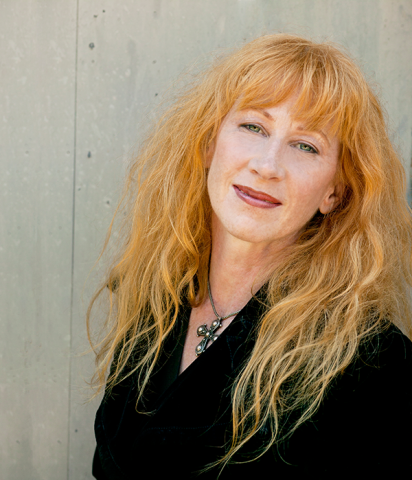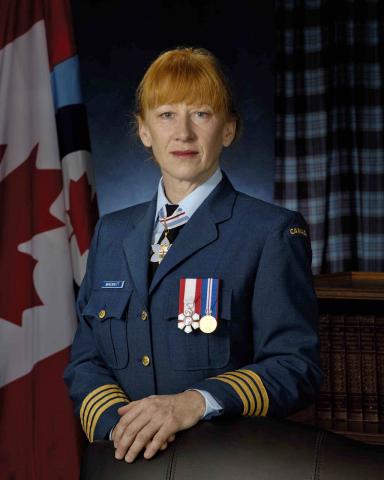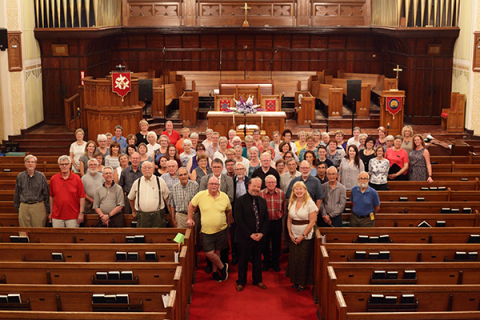
The Royal Canadian Air Force, with whom the 60-year-old Manitoba-born, Stratford, Ontario-based McKennitt serves as an Honorary Colonel, has produced a moving video to accompany the five-minute-plus tune, which includes participation from Ottawa’s Central Band of the Canadian Armed Forces and the 90-voice Stratford Concert Choir.
The video (watch below) begins with a lengthy shot of the Breaking of the Sword memorial located in Vimy, France – the site of The Defenders, a group of 20 symbolic statues located near the World War I battleground of Vimy Ridge where Canadian forces repelled the German Sixth Army that had been occupying the Nord-Pas-de-Clais region of France, sacrificing nearly 3600 troops in the process.
The video intermingles footage from World War I, World War II and current global peacekeeping efforts and show them both serving and funeral processions of a few who died in the line of duty.
Canadian digital sale proceeds of “Breaking of the Sword” are earmarked for the Support Our Troops Fund, which offers financial support and assistance to Canadian Armed Forces members, veterans and their families, funded through individual and corporate donations and other sources.
This is not McKennitt’s first act of charity using her celebrity status: in 1998, she experienced firsthand tragedy when her fiancé Ronald Rees, his brother Rick and their friend Gregory Cook went missing after a boating accident in Nottawasaga Bay, near Georgian Bay.
McKennitt and members of the Rees and Cook families established The Cook-Rees Memorial Fund for Water Search & Safety, donating a $60,000 Sea Scan sonar system designed to detect objects in deep water to Ontario Provincial Police Underwater Search and Recovery Unit as well as a $75,000 Shark Marine multipurpose remote operated vehicle (ROV).
McKennitt also donated proceeds from her CD set Live In Paris and Toronto, raising $3 million as of 2013 for education, research, training and equipment purchases to benefit water safety causes.
Currently, however, the Member of the Order of Canada and mother of one is focusing on our Canadian troops. She talked to Samaritanmag about “Breaking of the Sword” and its impactful message.
Why is this your first release of new music in 11 years?
It’s that “life happens” kind of answer. I’ve been more devoted to family time and we’ve also been doing a lot of touring over the last three or four years. We’ve done about three laps into different regions of the United States. Last spring, we did about a month of touring in Europe. So, between family time and touring, time just goes by.

One of the functions of these roles is to be a bridge or a conduit between the Air Force and the Canadian citizenry. Part of the duties and responsibilities you might say is just to share what one is learning and observing inside the Air Force with civilians. Most certainly, I have learned a lot. I came from Manitoba – not from a military family and I was initially attached to a search and rescue and transport squadron out of Winnipeg who have a fleet of Hercules (aircraft.) When I started out, I flew around with them on various kind of training exercises as well as our other exercises. They do search-and-rescue, disaster relief, peacemaking, peacekeeping, combat, the whole international relief.
So, the Honorary Colonel role is really there to witness that and share that with Canadians. There are other opportunities within the Air Force to add one’s own experience into the mix. Sometimes you have a chance to sit with your commanding officer and they might want to just run things by you just from an outsider’s standpoint on certain things, not many. But I think one of the main goals is to prevent the kind of insularity that can occur in these kinds of organizations. I’ve certainly have felt that I have gotten more out of them than perhaps they have gotten out of me.
How has serving affected you?
I just have grown to have a much deeper appreciation of what they do, how they do it, what the compromises and sacrifices are to the serving members as well as their families. And certainly, when I got appointed the Honorary Colonel for the RCAF, my mind focus has been looking at the challenges that families have. And in the Air Force, they move around every two or three or four years and that can be pretty tough on families, when you’re relocating children into schools. It’s finding schools. Selling the last house. Finding the new house. Getting a doctor. Dealing with spousal employment. Things like drivers’ licence. So, they barely get settled and they pick up and move again. I had no appreciation of this. How it’s changed me – it’s given me a deeper appreciation as a citizen for that community of people. I’m also a firm believer that democracy doesn’t thrive as a spectator sport. It’s given me an opportunity to support those who serve us.
Did the inspiration for “Breaking of the Sword” come to you after visiting Vimy for the first time?
It came about when I was asked to perform (“Dante’s Prayer” at the Live at Vimy Ridge 100th commemoration) service last April. I was first approached last November and during the Christmas holidays, I came up with this piece. Before I could even present it, it was decided that organizers wanted me to perform something from my catalogue. So, I had this piece written and I was already in the process of advancing a new recording and I thought well, maybe this could go on the next recording, and then I took the step of tracking it.
This song is epic.
It is true. I think having been amongst the military community – or the military family – for 10 or 11 years, I have some idea of how they work and how they feel. It is an exceptional community – the Air Force – and I’ve also had the honour of attending a couple of repatriation ceremonies as well as commemorative ceremonies for people who are serving. Out in Comox, there was a search-and-rescue technician who perished a couple of years ago. Last year, there was one in Cold Lake – and I realize that those ceremonies, there’s also the military family who mourns. That not only is it the family in which the individual was born and raised, but the next family that comes along is the military family, and there are a lot of family-like characteristics about it and very, very powerful bonds. And then, of course, there’s the third kind of family – and that is that of the community.

How did you come up with the perspective?
The perspective was very much inspired when I was first approached to perform at Vimy. I had not been to that memorial site at all, so when I did some research and I came across this image called Canada Bereft, which is this mother-like figure with her head bowed and I thought I had just been extrapolating what a parent would feel like attending a place like that, whether it was Vimy or any other place that was designed to commemorate the losses and sacrifices, and just trying to imagine what would go through their mind as they were standing at this site. to imagine what was going through their mind as they were standing at this site. And for myself as a mother, I know that I would reflect back on the very earliest days of my child. I can go through some of the narrative of how the time we spent together and then perhaps as they got older and there was that decision or that call to go and serve, and of course that moment you say, Well, I remember the last time I saw them. It was…there. And for many who served in the First World War, and the Second, I guess, it was often the train stations. A family never knew if their loved ones were coming back or not. I wanted to touch a bit on that kind of narrative.
Proceeds from the digital sales of the song in Canada are going to Support Our Troops Fund. What is their mandate?
The fund is situated within the Canadian Forces. There is a department of Morale and Welfare Services that is designed to support a broad spectrum of needs, whether it’s family needs or its need for serving members. I would love to feel that in this day and age the revenue generated could be something significant. Unfortunately, within the way the music industry is structured – with streaming, where you get ten cents per 1000 plays – it’s hard to say. With digital downloads, it’s different. But I really felt that in the awareness-building exercise of this piece, I really wanted to make sure that every effort was made to support that community – that it wasn’t about me or my needs or my career. And perhaps really more importantly than any financial contribution is just awareness building.
What does the fund actually provide?
Well, serving members or their families can apply to that fund for whatever their needs might be. I’m trying to recall the spectrum of those situations. I do know it goes quite wide. There are a variety of funds out there to support. Some are very targeted. but this is one that exists within the Canadian Forces. Let’s say, for education for a child, especially if it’s someone who has perished and they’ve lost that income, there may be money available for educational purposes. There might be money for medical purposes.
How do you hope to extend the song and its message beyond Remembrance Day?
I’m hoping that perhaps it will become a perennial type of thing – that maybe this piece will enter the lexicon of band arrangements that are done in communities or schools or it might be rendered as a choral piece. It can have different kinds of lives. We’ll see.
What is the biggest misconception of the military?
I certainly didn’t appreciate the governance platform. For example, when I came into this role, I didn’t appreciate them. But essentially, we’re lucky to live in a country like Canada where the military is a neutral force. It is instructed by the government of the day, and the government of the day, of course, is voted in by we as citizens. In terms of misunderstanding or perhaps a lack of appreciation, a number of people just think military and that they are off doing whatever they want, where in actual fact they are this neutral force that is standing by to do what the government of Canada asks it to. They may have their personal feelings or even professional feelings, but they’re really there to serve Canadians and support the international community. So, for me, that was, less a misunderstanding, than just a really critical understanding to acquire.
Do you feel the Canadian government is doing enough for our troops in terms of currently supporting them at home and abroad?
It’s not really for me to say or comment. I know that there are a whole spectrum of mechanisms and departments designed to support. I’m sure that everybody would say that there’s always more that can be done. I think for me, the important thing in the lineage of things is that the public understands and appreciates what they do and how they sacrifice and compromise including families. But there is also a kind of conversation between citizens and their Members of Parliament and they encourage those Members of Parliament to support those who serve better. So, I think each one of us can undertake the examination and ask that question. But I know that in speaking with a number of folks in the Air Force, they’re incredibly modest and I don’t see many frills at all, but rather a lot of – there’s inconvenience within family life.
I remember, with a couple of trips that I’ve made, say there was a piece of equipment that fails and I know on one occasion where a family had set aside some holiday time. We were kept up North somewhere for a couple of days and that family lost some of that window. I mean, I think if you ask a lot of the people who serve, or the ones that I’ve spoken to in the Air Force, they would say one of the very first things is that they would love to know that the Canadian public has a deeper appreciation for what they do. I’ve been concerned, perhaps that there could be more done in the education system. I’ve wondered about the fact that students don’t even sing ‘O Canada’ anymore, or don’t know how to stand at attention. You go to Remembrance Day services in some places and all the children are at school and not at the cenotaph. I think that there’s a great importance in the act of not just remembering, but acknowledging the commitment and the sacrifice that these people make.
The Invictus Games (an annual international multi-sport Olympics-like event, created by Prince Harry in 2014, in which wounded, injured or ill armed services personnel and veterans take part in sports) recently came to Toronto (in September.) Did you receive any reaction or thoughts from your RCAF associates?
I was aware of the Games but I wasn’t able to attend. I was working on recording. But my feeling is that it has immense value. You look at individuals who become physically or mentally injured and still have an enormous amount to contribute. I feel that these Games offer those individuals an opportunity to assert that.
How do you hope to extend the song and its message beyond Remembrance Day?
I’m hoping that perhaps it will become a perennial type of thing – that maybe this piece will enter the lexicon of band arrangements that are done in communities or schools or it might be rendered as a choral piece. It can have different kinds of lives. We’ll see.
Kopačky na fotbal